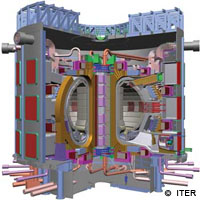Educating engineers for ITER
As preparations get underway to build ITER, the International Thermonuclear Experimental Reactor, a group of European nuclear fusion research institutes have come together to create a high-level, specialised training programme for the next generation of nuclear fusion researchers. Engineers are in short supply across the profession, and the field of nuclear fusion is no exception to this rule. Nevertheless, building and running ITER, which will be situated at Cadarache in the south of France, will require highly trained nuclear fusion engineers with skills specific to the ITER project. The European Commission has set up a programme called the 'European Fusion Training Scheme (EFTS)' to ensure the provision of engineers who have been trained with the technically demanding requirements of ITER in mind. In the framework of the EFTS, the Juelich Research Centre in Germany, together with research institutes in the Netherlands, the UK, France, Demark, the Czech Republic and Germany have created a training programme called 'Engineering of Optical Diagnostics for ITER' (EODI). Optical measurement methods are vital to the running of fusion reactors, as they provide researchers with information on the condition of the fusion material, the distribution of temperatures, its pressure and the number of particles. EODI will offer up to eight young engineers the chance to acquire specialised skills by spending three years working on existing fusion experiments and following relevant training courses. At the end of the programme, participants should be well placed to work in the nuclear fusion field, either as part of the ITER team itself or in one of the local research and development teams. Staff are already working at the ITER site in Cadarache, laying the groundwork for its construction, which is due to begin in 2008. If all goes according to plan, the reactor should become operational in 2016.
Countries
Czechia, Germany, Denmark, France, Netherlands, United Kingdom



